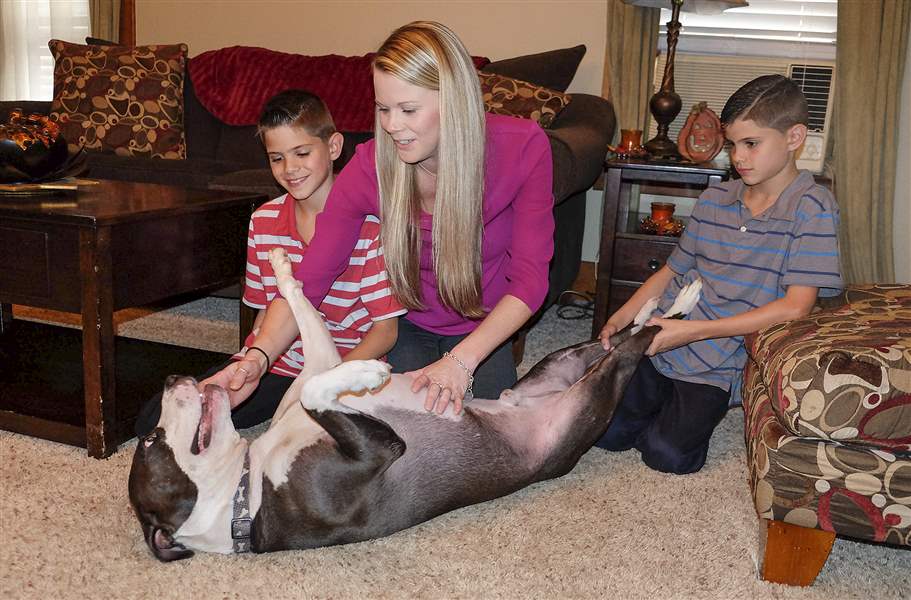
Appeals court remands Toledo dog case
‘Substantial justice was not done,’ judges say
10/21/2016
Jamie Rego and her twin sons, Blake, left, and Drew Madalinski, play with Kingston in their Toledo home. Kingston was viciously attacked by another dog when he was 5 months old in 2014.
THE BLADE/LORI KING
Buy This Image
Editor’s note: This article corrects the spelling of Jamie Rego’s last name.
The 6th District Court of Appeals has taken a stand by placing a higher value on companion animals.
The court recently remanded a 2015 civil suit over an injured dog back to Toledo Municipal Court for a hearing on damages awarded in the case by determining “substantial justice was not done” by the trial court in awarding the plaintiff only $400 — or the dog’s market value — in December.
“We agree with and acknowledge that pets do not have the same characteristics as other forms of personal property, such as a table or sofa which is disposable and replaceable at our convenience,” the three-judge panel wrote in the decision filed Friday.
The original lawsuit filed in municipal court in April, 2015, showed plaintiff Jamie Rego of Toledo spent more than $10,000 in veterinary care for the family dog after the “pit bull” puppy was attacked by an adult dog.
“I can’t put a value on him,” Ms. Rego of Toledo said of Kingston, now 2 years old. “He’s not an object, he’s a living animal.”
At 5 months old in November, 2014, Kingston was seriously injured by his father, a “pit bull” named Nino owned by Shawn Madalinski. The pup had been visiting Mr. Madalinski’s Toledo home with the two children Ms. Rego and Mr. Madalinski share.
Nino attacked his offspring in the backyard of the home, causing three broken legs and numerous puncture wounds. Ms. Rego said veterinarians determined Kingston would heal and retain a good quality of life with surgery. Bills for emergency treatment, hospitalization, orthopedic surgery, and other veterinary care totaled $10,731.
“When your kids look at you and ask if you’re going to save him or put him down, what do you say?” Ms. Rego said. “I was under the impression [Mr. Madalinski’s] insurance company was going to pay for it, or at least help to pay for the majority of it.”
Ms. Rego originally sought $15,000 in damages to pay for the expenses plus any necessary future care stemming from Kingston’s injuries. The postappeal damages hearing in municipal court has not yet been scheduled.
Mr. Madalinski said he took Nino to a veterinarian to be killed last year at his insurance company’s request.
“I made the claim with my insurance company to help out with the bills,” he said.
He said though he is named as the defendant, the lawsuit is primarily between Ms. Rego and the insurance company. He said he has been largely uninvolved in the case aside from giving a deposition.
Todd McKenna, Mr. Madalinski’s claims attorney with American Family Insurance in Columbus, did not return a phone call from The Blade seeking comment.
Pets are legally considered personal property in Ohio. Compensation for damages to personal property are generally limited to fair market value or the cost of repairs, whichever is less, said Ms. Rego’s attorney, David Rice of Churchill, Smith, Rice, Swinkey & Kuhn in Temperance.
“A dog is not like most items of personal property,” Mr. Rice said.
The appeals court and Mr. Rice noted there have been numerous cases in Ohio and across the country where veterinary expenses were included in economic damages awarded to pet owners.
“It certainly is logical to expect that a dog owner is going to take a dog to the veterinarian and seek veterinary care,” Mr. Rice said. He noted that if Kingston had died before being treated, Ms. Rego would be entitled to only his market value.
Ms. Rego said she believes she made the right choice in saving Kingston. He is happy and generally healthy, although he needs another surgery on a front leg to remove a bone pin that become troublesome as he grew and to correct an injured growth plate that is causing the leg to twist. With the outstanding veterinary bills, she cannot afford the second surgery.
“I did the right thing by saving him,” she said. “We love him. He’s part of the family. I just want his medical bills paid. It would be great to pay for future medical bills, but right now, just pay off the original bill. That’s a lot of money that could go to a lot of other things.”
In its decision, the appeals court was clear that Ms. Rego cannot receive compensation for noneconomic damages.
“You can’t recover the emotional impact of the loss of a dog,” Mr. Rice said.
A few states do provide for some monetary compensation for emotional damages. Tennessee, for example, allows up to $5,000 to be awarded to dog and cat owners for “the loss of the reasonably expected society, companionship, love, and affection of the pet.”
While the law is evolving and a majority of case law now favors compensation for veterinary expenses, Mr. Rice does not see a trend toward granting relief for pet owners’ emotional strife.
“That would be a big stride, and I don’t foresee it evolving to that degree anytime soon,” he said.
Ms. Rego said while she would like to see the law cover noneconomic damages, she’s just thankful Kingston is alive and well, and that she should receive some repayment for his care.
“My kids and I adore him, and are happy he is in our life,” she said.
Contact Alexandra Mester: amester@theblade.com, 419-724-6066, or on Twitter @AlexMesterBlade.